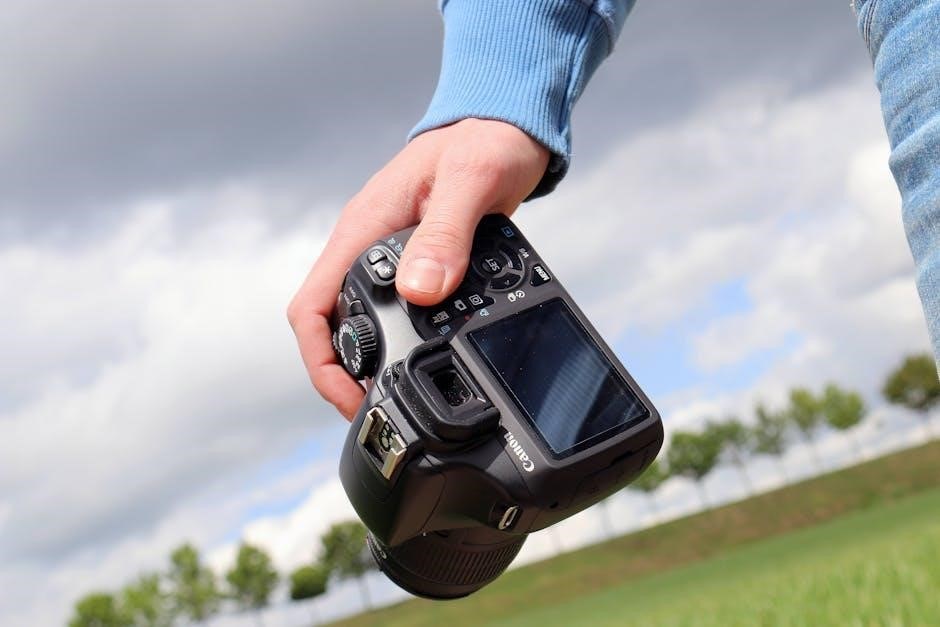The amateur radio license manual is a guide for obtaining a license, covering rules and regulations, with
- step-by-step instructions
and
- study materials
to help prepare for the exam, providing a comprehensive overview․
Overview of Amateur Radio Licenses
The Federal Communications Commission issues amateur radio licenses, which are valid for ten years․ An amateur radio license is required to operate a transmitter on Amateur Radio Service frequencies․ The license grants permission to use specific frequencies and modes of operation․ There are three levels of licenses, each with its own set of privileges and requirements․ To obtain a license, one must pass an examination administered by a Volunteer Examiner Coordinator․ The examination covers topics such as radio theory, operating practices, and regulations․ The question pool for the examination is available online, and study materials such as the ARRL Ham Radio License Manual can be used to prepare․ By obtaining an amateur radio license, individuals can participate in a hobby that combines technology, communication, and community service, with opportunities to experiment with new technologies and connect with others worldwide․ Various resources are available to help individuals get started․
Importance of Obtaining an Amateur Radio License
Obtaining an amateur radio license is essential for individuals who want to operate a transmitter on Amateur Radio Service frequencies․ The license ensures that operators understand the regulations and safety protocols, minimizing interference and promoting responsible use of the radio spectrum․ By obtaining a license, individuals demonstrate their commitment to the hobby and their willingness to follow established guidelines․ This, in turn, helps to maintain the integrity of the amateur radio community and protects the rights of licensed operators․ The license also provides a sense of accomplishment and pride, as individuals have demonstrated their knowledge and skills in passing the examination․ Furthermore, the licensing process helps to promote a culture of safety, etiquette, and respect among amateur radio operators, which is essential for the continued growth and development of the hobby․ Overall, obtaining an amateur radio license is a crucial step in becoming a responsible and knowledgeable amateur radio operator․

Types of Amateur Radio Licenses
There are three main types of licenses, issued by the FCC, with varying levels of
- privileges
and requirements, including operating frequencies․
Technician License
The Technician License is the entry-level license for amateur radio operators, and it is the most popular license among hobbyists․ To obtain a Technician License, one must pass a 35-question multiple-choice exam, with a minimum of 26 correct answers required to pass․ The exam covers topics such as radio theory, operating practices, and safety procedures․ The Technician License allows operators to transmit on certain frequencies, including VHF and UHF bands, and to participate in local and regional amateur radio communications․ It is a great way for beginners to get started with amateur radio, and it provides a foundation for further study and advancement to higher-level licenses․ The FCC issues the Technician License, and it is valid for a period of 10 years, after which it must be renewed․ The license is an essential step in becoming an amateur radio operator․
General License
The General License is a mid-level license that offers more privileges than the Technician License․ To obtain a General License, one must first hold a Technician License and then pass a 35-question multiple-choice exam, with a minimum of 26 correct answers required to pass․ The General License exam covers more advanced topics, including radio theory, transmission practices, and operating procedures․ The license allows operators to transmit on a wider range of frequencies, including HF bands, and to participate in international amateur radio communications․ The General License is a step up from the Technician License and provides more opportunities for amateur radio operators to engage in their hobby․ It is also a requirement for those who wish to pursue the Amateur Extra License, which is the highest level of licensure․ The General License is issued by the FCC and is valid for 10 years․
Amateur Extra License
The Amateur Extra License is the highest level of licensure for amateur radio operators, offering the most privileges and operating frequencies․ To obtain this license, one must first hold a General License and then pass a 50-question multiple-choice exam, with a minimum of 37 correct answers required to pass․ The exam covers advanced topics, including radio theory, antenna design, and signal processing․ The Amateur Extra License allows operators to transmit on all amateur radio frequencies, including HF, VHF, and UHF bands, and to participate in all types of amateur radio communications․ The license is issued by the FCC and is valid for 10 years․ With this license, operators can enjoy the full range of amateur radio activities, including contesting, DXing, and experimenting with new technologies․ The Amateur Extra License is the ultimate goal for many amateur radio operators, requiring a high level of knowledge and expertise․

Study Materials for Amateur Radio Licenses
Online resources, including
- flashcards
and
- practice tests
, provide essential study materials for amateur radio licenses, covering key concepts and rules, with comprehensive guides and study aids available online․
ARRL Ham Radio License Manual
The ARRL Ham Radio License Manual is a comprehensive guide for obtaining an amateur radio license, covering all aspects of ham radio operation․ The manual is published by the American Radio Relay League and is available in various formats, including print and digital editions․ It provides detailed information on the rules and regulations of amateur radio, as well as study materials and practice tests to help prepare for the license exam․ The manual is widely considered to be one of the most authoritative and effective study guides available, and is used by thousands of individuals each year to obtain their amateur radio license․ With its clear and concise language, the ARRL Ham Radio License Manual is an essential resource for anyone looking to get started in amateur radio, and is a valuable tool for experienced operators looking to upgrade their license or improve their skills․
Online Study Guides and Practice Tests
Online study guides and practice tests are valuable resources for individuals preparing to take the amateur radio license exam․ These online tools provide access to a wide range of study materials, including question pools, flashcards, and practice tests․ Many online study guides are available for free, while others require a subscription or one-time payment․ Some popular online study guides offer interactive features, such as quizzes and games, to help make studying more engaging and effective․ Additionally, online practice tests can help individuals assess their knowledge and identify areas where they need to focus their studying․ By using online study guides and practice tests, individuals can prepare for the amateur radio license exam at their own pace and on their own schedule, increasing their chances of passing the exam and obtaining their license․ Online resources are convenient and accessible․

Preparing for the Amateur Radio License Exam
Preparation involves understanding rules and regulations using
- online resources
and study guides․
Understanding the Question Pool
The question pool is a collection of potential exam questions, and understanding it is crucial for preparation․ The pool is rearranged to follow topics as presented in the ARRL Ham Radio License Manual․ The NCVEC Question Pool Committee releases the question pool, which is then used to create study guides and practice tests․ By familiarizing oneself with the question pool, individuals can better prepare for the exam and increase their chances of passing․ The question pool covers various topics, including rules and regulations, operating practices, and technical knowledge․ It is essential to study the question pool thoroughly, using online resources and study guides, to ensure a comprehensive understanding of the material․ This will help individuals to feel more confident and prepared when taking the exam, and ultimately, to obtain their amateur radio license․ The question pool is a valuable resource, and understanding it is key to success․
Using Flash Cards and Practice Tests to Prepare
Flash cards and practice tests are essential tools for preparing for the amateur radio license exam․ These resources help individuals to review and reinforce their knowledge of key concepts and terminology․ By using flash cards, individuals can quickly review important information and identify areas where they need to focus their studying․ Practice tests, on the other hand, provide a simulated exam experience, allowing individuals to assess their knowledge and identify areas for improvement․ Many online resources offer free ham radio flash cards and practice tests, making it easy to access these study aids․ Using these tools, individuals can track their progress and stay motivated as they work towards obtaining their amateur radio license․ With consistent practice and review, individuals can feel confident and prepared for the exam, and increase their chances of passing․ Effective use of these resources is critical to success․

Benefits of Obtaining an Amateur Radio License
Obtaining an amateur radio license offers numerous benefits, including the ability to communicate with others locally and globally․ With a license, individuals can participate in emergency communications, providing critical support during disasters and other events․ Amateur radio operators can also connect with others who share similar interests, fostering a sense of community and camaraderie․ Additionally, amateur radio operators can experiment with new technologies and techniques, staying at the forefront of innovation․ Many amateur radio operators also find the hobby to be a fun and rewarding way to learn about science, technology, engineering, and math (STEM) concepts․ Overall, obtaining an amateur radio license can be a rewarding experience that opens up new opportunities for communication, community engagement, and personal growth․ The benefits of amateur radio operation are diverse and far-reaching, making it a hobby that can be enjoyed by people of all ages and backgrounds․
